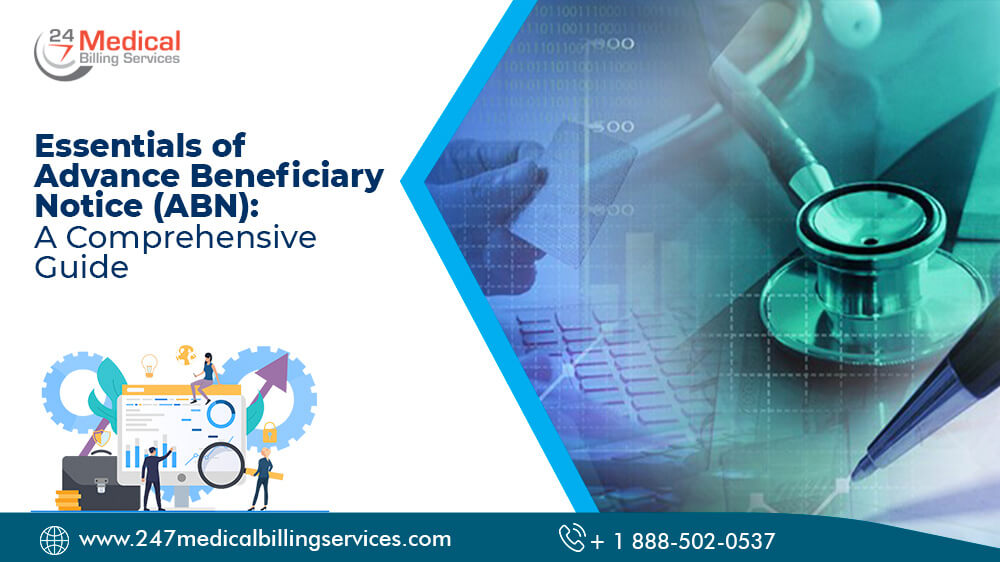
Essentials of Advance Beneficiary Notice (ABN): A Comprehensive Guide
With so many forms that need to be filled out these days, it's easy to become bogged down in the terminologies, guidelines, and coding requirements. This is the most common challenge with the Medicare-Fee-For-Service and the Advance Beneficiary Notice (ABN) form. Most of us are aware of the phrase ABN and have a broad concept of when it should be used, but when working with Medicare-Fee-For-Service patients, there are certain vital regulations to follow. Inadequate knowledge of these rules can result in costly mistakes in your practice.
Many medical professionals are aware that detailed protocols must be followed for Medicare reimbursement, and an ABN is an essential part of those procedures.
Advance Beneficiary Notice (ABN)
A waiver notice (standard government form CMS-R-131) that healthcare providers are obligated to offer Medicare patients whose services may not be reimbursed by Medicare is termed an ABN - Advance Beneficiary Notice of Noncoverage.An ABN will include a list of items and services that Medicare is not expected to pay for, an estimate of the expenses for the items and services, and explanations for why they will not be paid. Before any service is performed, notifiers must furnish an ABN.
Notifiers include the following:
- Physicians, healthcare providers, inclusive of institutional providers such as outpatient hospitals
- Part B paid practitioners and suppliers, including independent laboratories
- Hospice providers and religious non-medical healthcare institutions are only paid under Part A.
- Home health care agencies (HHAs) that provide services under Part A or Part B
Types of ABNs
-
Skilled Nursing Facility Advance Beneficiary Notice (SNFABN):
-
Hospital Issued Notice of Noncoverage (HINN):
Importance of ABNs
An ABN is necessary for the patient since it provides transparency and the ability to accept or decline services. Receiving an ABN, however, does not preclude filing an appeal as long as Medicare was billed.Responsibility for denied charges may be rendered null and void if the ABN:
- Is challenging to read or comprehend
- Does not include the actual service delivered or is signed after the service was rendered
- Is given to every patient by the provider (excluding a lab) with no basis for denial
- Is administered during an emergency or immediately before receiving a service (for example, quickly before an MRI).
Steps of ABNs
- Complete the form by filling in all of the blank fields. This comprises the item or service, the rationale for the anticipated denial, and the monetary amount owing.
- The form must be legible and simple to read. This includes the paper, the contrast, and the font size. The CMS website offers several versions of the form, including large types and versions in languages other than English.
- Examine the form with the beneficiary (or their representative) to confirm that they understand the document's purpose and financial responsibilities.
- You must explain and answer all questions about the service and why it is being recommended in addition to Medicare benefits.
- The beneficiary must check the box next to the option they want (the forms may differ slightly):
- Option - agreeing to the service and accepting financial obligation
- Option - agreeing to the service and accepting the financial obligation (do not bill Medicare).
- Option - Declining the service
- After the beneficiary has signed and dated the form and made a selection, you must provide them with a paper copy of this form. Your copy must be kept for five years from the date of service.
You may seek payment from the patient once the beneficiary signs the document and agrees to proceed with the service or item. Keep in mind that if Medicare pays for part or all of the service, the beneficiary must receive an immediate refund
ABN Forms to be Filled
- Part A Skilled Nursing Facility (SNFABN CMS-10055)
- Exclusion of Skilled Nursing Facilities (CMS-20014)
- Home Health Agency (CMS-10280)
- Hospital Issued Non-Coverage Notice (HINN10-HINN11-HINN12-HINN1)
Outsourcing for Maximizing Reimbursements
The ABN is meant for the beneficiary and provider as a protection shield. Outsourcing medical billing partners ensure that beneficiaries understand the conditions under which the ABN is required or voluntary. Similarly, it is critical to ensure that ABNs are properly completed and contain enough information to advise the beneficiary of the likely reason for non-coverage and their choices upon receipt of an ABN.If you lack all such information or are short of time, contact Outsourcing partners like 24/7 Medical Billing Services for free consultations and maximizing reimbursements.
See also: Incident To Billing: Unravelling The Complexity In Medical Practices

.png)